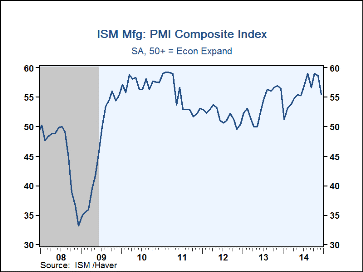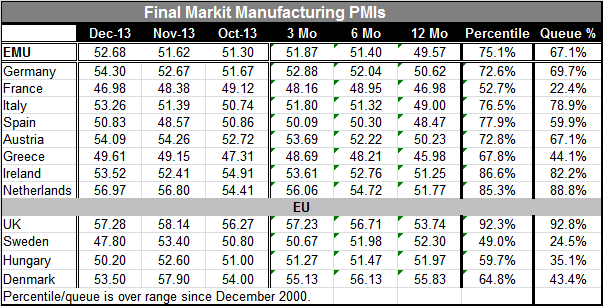 Global| Jan 02 2014
Global| Jan 02 2014EMU PMIs Push Higher Except For France
Summary
The overall EMU PMI rose in December by better than one point to a solid 52.68. Being above 50 in the PMI framework means that output is expanding and with the gain in December it is expanding faster than in November. The queue [...]
 The overall EMU PMI rose in December by better than one point to a solid 52.68. Being above 50 in the PMI framework means that output is expanding and with the gain in December it is expanding faster than in November. The queue percentile in the table expresses the current value of the PMI as a percentile standing in its historic queue back to early 2001. The EMU PMI ranks 50th among the last 152 monthly observations, leaving it in the 67th percentile of its historic queue - a top one-third standing. Germany's PMI of 54.3 is a top 69 percentile standing in its queue. The top four EMU nations' manufacturing PMIs have strong standings except for France. France's metric fell sharply this month to 46.98 from 48.38. Its standing is in the lower 22 percentile of its historic queue.
The overall EMU PMI rose in December by better than one point to a solid 52.68. Being above 50 in the PMI framework means that output is expanding and with the gain in December it is expanding faster than in November. The queue percentile in the table expresses the current value of the PMI as a percentile standing in its historic queue back to early 2001. The EMU PMI ranks 50th among the last 152 monthly observations, leaving it in the 67th percentile of its historic queue - a top one-third standing. Germany's PMI of 54.3 is a top 69 percentile standing in its queue. The top four EMU nations' manufacturing PMIs have strong standings except for France. France's metric fell sharply this month to 46.98 from 48.38. Its standing is in the lower 22 percentile of its historic queue.
The French drop is disturbing as France is the second largest EMU nation. But it has been the weakest member among the top four EMU nations (Germany, France, Italy and Spain) over the past year. While France's manufacturing metric fell sharply in December, French auto registrations and sales have been improving. We will want to keep a close eye on January to see if France's December drop is a skid into some real trouble or just a one-month setback.
Apart from France, Greece has the weakest queue standing of the EMU nations in the table. But Greece is showing improvement and is close to ending its multi-year contraction in its manufacturing sector. Despite its weak reading, Greece is a success story.
The UK manufacturing PMI fell back in December, but it is still the strongest raw reading in the table with the highest queue percentile standing as well. The UK manufacturing sector is still quite hot. Other EU members that are not in the common currency area are now lagging behind the EMU standard. Sweden, Hungary and Denmark's manufacturing readings fell sharply in December. Sweden now indicates manufacturing sector contraction while Hungary is showing only the barest of manufacturing gains. Denmark is still showing a manufacturing advance, but its reading is the lowest since April 2013. Sweden's manufacturing sector's queue standing is in the 24th percentile of its historic queue; for Hungary the standing is the 35th percentile; and for Denmark it is the 43rd percentile. Whatever is now going right in EMU it is not expanding its reach beyond the common currency area where conditions are largely deteriorating.
But for EMU the upswing story is largely a good one. Of the eight EMU nations in the table, all but two (France and Austria) made gains in December. Most of these same countries have made manufacturing diffusion reading gains of about 20 points from their respective cycle lows. The exceptions are Greece that is up only about 12 points from its cycle low and France that is up by about the same amount. Among the EMU members in the table, France is also the farthest from its cycle peak in its manufacturing diffusion reading, being still more than 10 points shy of its pre-recession peak mark.
On balance the EMU region seems to have its manufacturing sector in gear. France is a notable exception to keep an eye on. In separate readings today both France and Spain posted solid gains in auto sales and registrations. Despite France's manufacturing difficulties, it may still have an underlying improving trend. Optimism on Europe is still warranted but so is caution in the case of France.

Robert Brusca
AuthorMore in Author Profile »Robert A. Brusca is Chief Economist of Fact and Opinion Economics, a consulting firm he founded in Manhattan. He has been an economist on Wall Street for over 25 years. He has visited central banking and large institutional clients in over 30 countries in his career as an economist. Mr. Brusca was a Divisional Research Chief at the Federal Reserve Bank of NY (Chief of the International Financial markets Division), a Fed Watcher at Irving Trust and Chief Economist at Nikko Securities International. He is widely quoted and appears in various media. Mr. Brusca holds an MA and Ph.D. in economics from Michigan State University and a BA in Economics from the University of Michigan. His research pursues his strong interests in non aligned policy economics as well as international economics. FAO Economics’ research targets investors to assist them in making better investment decisions in stocks, bonds and in a variety of international assets. The company does not manage money and has no conflicts in giving economic advice.
More Economy in Brief
 Global| Feb 05 2026
Global| Feb 05 2026Charts of the Week: Balanced Policy, Resilient Data and AI Narratives
by:Andrew Cates






